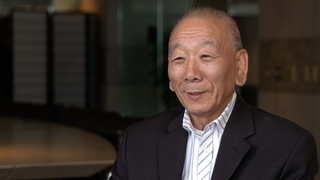Interviews
Little contact with Asians growing up on the east coast
By the time I was about 9 or 10, I would go out every summer to Los Angeles, and I would spend the summer with my cousin out there and my aunt. That was actually the only time I had contact with any Japanese. There was one Japanese American. There’s actually a side story to this. Later on, I’ll go into it. But there’s one Japanese food store on Connecticut Ave. called Miyako. There was the restaurant next to it, and that was the only Japanese restaurant in D.C. at the time I was growing up. So we would get Japanese food here and there. My mom would cook rice of course. But, principally, I grew up pretty white American, I would say. But, yeah, no contact. So that’s why—earlier I was telling you about there’s a big difference between east coast Japanese Americans and west coast Japanese Americans. When I grew up in D.C. there was only one other Asian Chinese girl, and I only met her when I was in 6th grade. So not a lot of contact. I would hang out with my cousin, but he’s about 5 years older than me, so we didn’t hang out that much. I usually hung out with the grandparents or the aunt and the uncle.
Date: September 12, 2003
Location: Tokyo, Japan
Interviewer: Art Nomura
Contributed by: Art Nomura, Finding Home.









